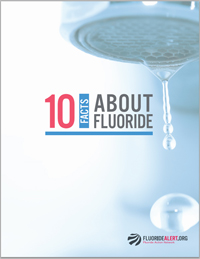Click HERE to jump to Environmental Systems Distributing's online catalog of home and
office drinking water filters and systems.
Make your own top quality drinking
water for about $0.03/gal.

 |
Read all about the 1950s pseudo-science
that plagues most US communities even today.
And if your community still insists on spiking your
tap water with that toxin, ESD can help.
 Click the pic to open the .pdf file (Adobe Acrobat Reader required). Click the pic to open the .pdf file (Adobe Acrobat Reader required).
|
Americans do not drink enough water
NEW YORK, Jun 02 (Reuters Health) - While Americans may
be awash in news about the benefits of consuming adequate amounts of water,
most fall short of recommendations to drink eight 8-ounces servings a day,
results of a new survey reveal.
According to the survey, nearly three quarters of Americans
are aware of the recommendation but only 34% actually drink this amount
of water each day. Most people consume only about 6 servings of water a
day and nearly 10% said they do not drink water at all.
What's more, Americans drink an average of nearly 6 servings
a day of caffeinated beverages such as coffee and soda. These drinks can
cause the body to lose water, making proper hydration even more difficult
to attain.
Water makes up more than 70% of the body's tissues and
plays a role in nearly every body function from regulating temperature
and cushioning joints to bringing oxygen to the cells and removing waste
from the body.
"Without proper hydration, the body is exposed to a variety
of health risks," said Dr. Barbara Levine, director of human nutrition
at The Rockefeller University in New York, which commissioned the survey.
Severe dehydration can affect blood pressure, circulation,
digestion and kidney function. But on a daily basis, not getting enough
water can cause fatigue, dry skin, headaches and constipation.
Among those surveyed, 37% mistakenly believe that people
need less water in cold weather and 49% erroneously believe the body loses
less water while sleeping than while awake.
Nearly one-third did not know that giving a child water
instead of sugar-containing drinks such as juice or soda can help prevent
childhood obesity, the survey revealed.
The survey of more than 2,800 people living in 14 US cities
was conducted by an independent research group for the International Bottled
Water Association.

Introduction
DID YOU KNOW???
What Contaminants Can Be
Found In Drinking Water?
· THMs and Chlorine-Many
municipal water systems use chlorine to eliminate bacteria, but recent
studies show that chlorine can react with organic material in water to
form chemicals called Trihalomethanes (THMs). One of these THMs is chloroform,
a suspected cancer-causing agent.
· Lead-The Environmental
Protection Agency (EPA) says that lead in drinking water can cause serious
health problems. At low levels, reduced birth weight and premature birth,
delayed mental and physical development, and impaired mental abilities
in children in general, may result. At high levels of exposure, anemia,
kidney damage, and mental retardation can occur.
· Radon-Radon is a naturally
occurring radioactive gas that has no taste, odor, or color. Waterborne
radon released into the air from showers, washing machines, etc. Can be
inhaled and increase the risk of lung cancer. There also is accumulating
evidence of a relationship between the ingestion of radon in drinking water
and increased risk of stomach cancer.
· Cysts-Protozoan parasites,
such as Cryptosporidium oocysts and Giardia lamblia cysts in drinking water,
can cause vomiting, diarrhea, an other flulike symptoms that are longer-lasting
and more debilitating than most cases of flu.
· Pesticides and Herbicides-Many
agricultural chemicals like atrazine and alachlor have found their way
into groundwater sources. Many pesticides are toxic and are associated
with a variety of health problems.
· Industrial Chemicals-Though
necessary in manufacturing, many industrial chemicals, if ingested, may
cause increased risk of cancer and others illnesses. Some of the industrial
chemicals that now threaten the purity and safeness of our drinking water
include polychlorinated biphenyls (PCBs), polynuclear aromatics (PNAs),
and volatile organic chemicals (VOCs), such as TCE, benzene, and carbon
tetrachloride.
· Other Particulate Contaminants-
Small fibers of asbestos, dirt, and other particles often can be found
in drinking water.
Note: No information exists to show
that the examples described above pertain to your specific water system
or supply.
Contamination:
How Serious Is It?
"Drinking tap water that is chlorinated
is hazardous if not deadly to your health."
HEALTHY WATER FOR LONGER LIFE -
DR. MARTIN FOX
"Known carcinogens are found in
drinking water as a direct consequence of the practice of
chlorination"
MUNICIPAL ENVIROMENTAL RESEARCH
LAB - FRANCIS T. MAYO, DIRECTOR
"Cancer risk among people drinking
chlorinated water is 93% higher than among those whose
water does not contain chlorine."
US COUNCIL OF ENVIROMENTAL QUALITY
"Chlorine is the greatest crippler
and killer of modern times. While it prevented epidemics of one
disease, it was creating another."
"...After the start of chlorinating our drinking
water in 1904, the present epidemic
of heart trouble, cancer and senility began."
SAGINAW HOSPITAL - DR J.M. PRICE
The National Academy of Sciences
estimate that 200-1000 people die in the United States each year from cancers
caused by ingesting the contaminants in water."
SCIENCIES NEWS, VOLUME 130 - JANET
RALOFF
"The cause of atherosclerosis and
resulting heart attacks and strokes is none other than the
ubiquitous chlorine in our drinking
water."
CORONARIES/CHOLESTEROL/CHLORINE
- DR. JM PRICE
Chlorine gas was used despicably
during WWI. When the war was over, the use of chlorine was diverted to
poisoning the germs in our drinking water. All water supplies throughout
the country were chlorinated. The combination of chlorine and animal fats
results in atherosclerosis, heart attacks and death."
WATER CAN UNDERMINE YOUR HEALTH
- DR. N.W. WALKER, D.S.
"48-49 states are failing to adequately enforce existing
drinking water regulations."
JAMES ELDER - U.S. ENVIRONMENTAL PROTECTION AGENCY
"Florida had 521 excessive contaminants violations
and 5,250 monitoring and reporting violations."
NATURAL RESOURCES DEFENSE COUNCIL - USA TODAY SEPTEMBER
27, 1993
"Scientists discovered that chlorine reacted with organic
material in water to produce hundreds of chemical by-products, several
of which have proved in animal studies to be carcinogenic."
U.S. NEWS AND WORLD REPORT - JULY 29, 1991
"Drinking chlorinated water may as much as double the
risk of bladder cancer."
NATIONAL CANCER INSTITUTE - KENNETH CANTOR
All information on this site is for general education and information purposes only and has not been evaluated by the FDA or FTC. The information contained herein is not intended to treat, cure, or diagnose any disease. If you suspect you have a health condition of any kind, contact a health care professional. Individual results may vary.

|

 Fluoride in Water Linked to Lower IQ in Children
Fluoride in Water Linked to Lower IQ in Children


 Click the pic to open the .pdf file (Adobe Acrobat Reader required).
Click the pic to open the .pdf file (Adobe Acrobat Reader required).